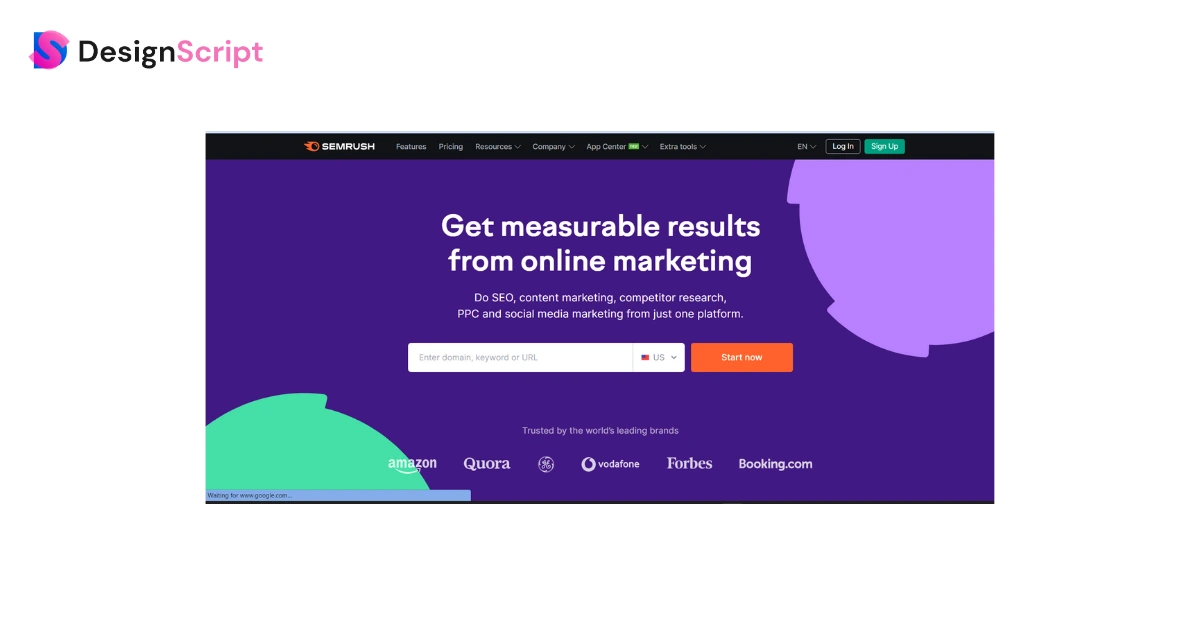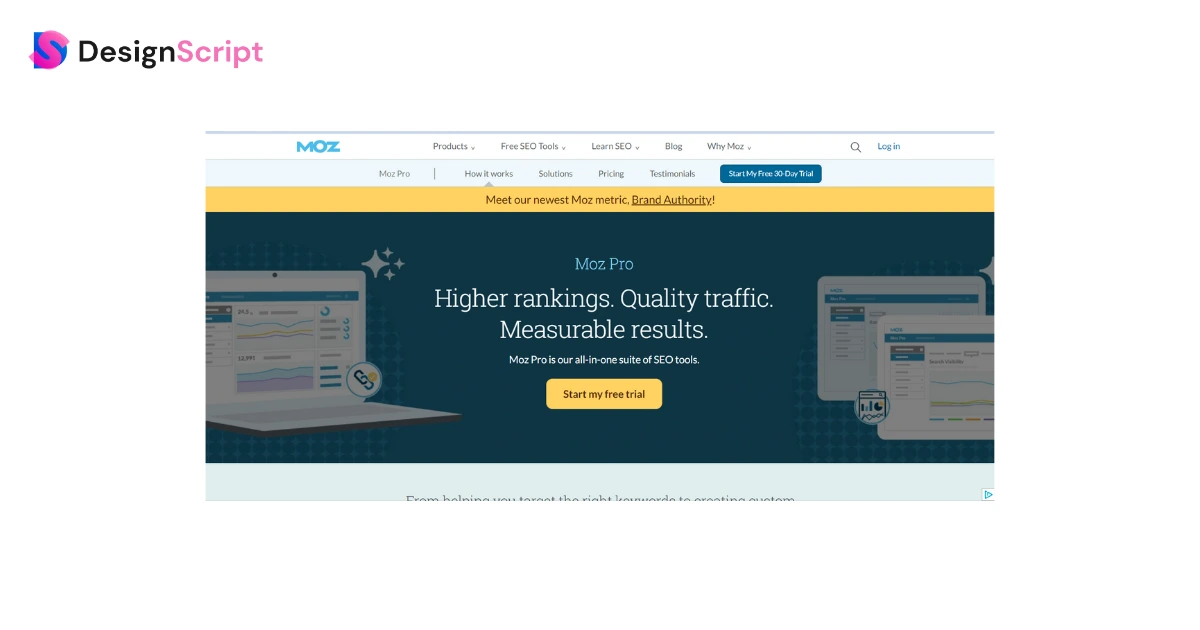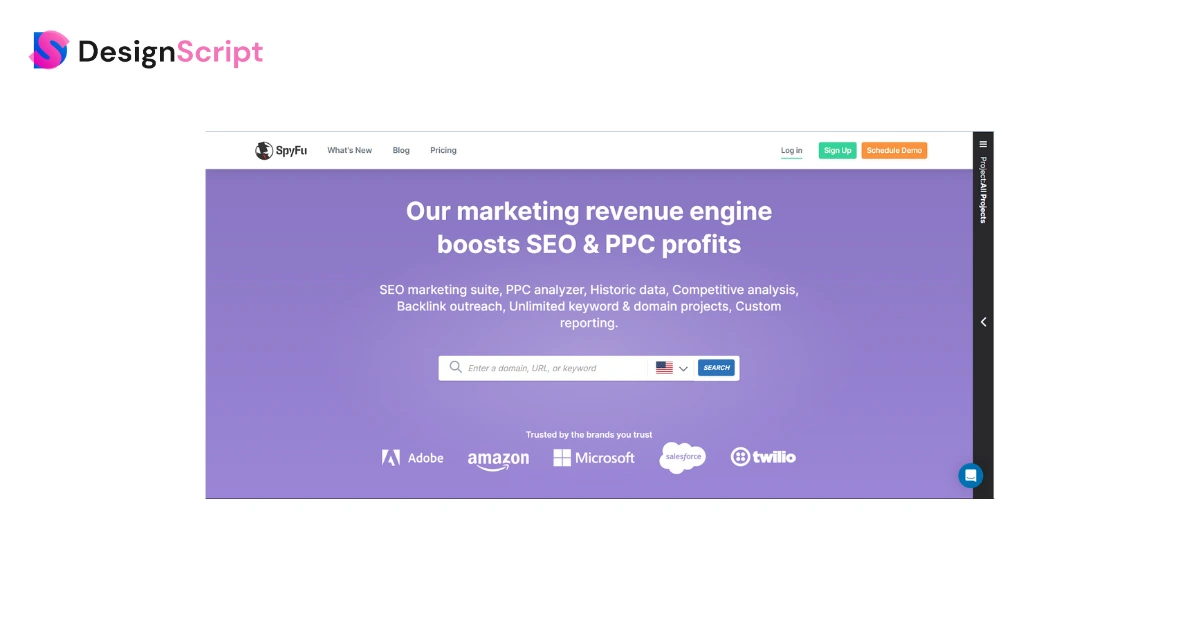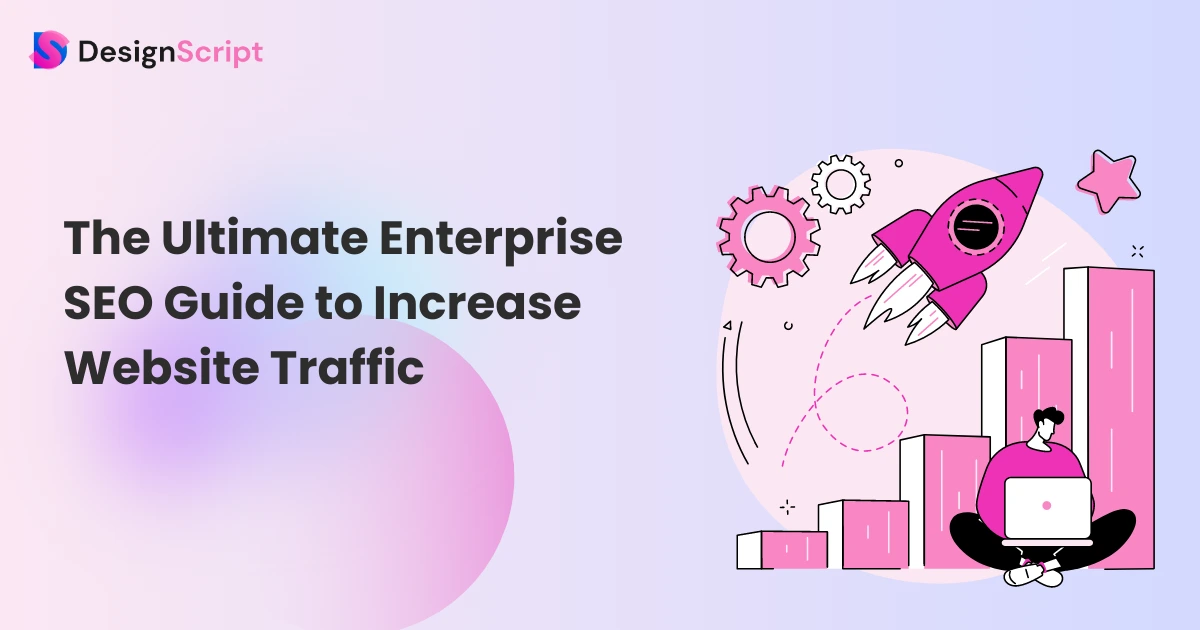The Ultimate Enterprise SEO Guide to Increase Website Traffic
As per Moz’s Report, a significant 91% of big businesses with multiple locations have dedicated full-time SEO resources.
That means search engine optimization is vital for businesses. It enhances your online visibility, making it easier for customers to spot you on search engines like Google.
When potential customers look for details about your business, they use a search engine. However, it’s not only your business that shows up – your competitors do, too. If your competitors rank higher, you might lose the customer.
A weak online presence could hinder customers from reaching you despite offering excellent service. So, without good SEO, you could lose customers to higher-performing competitors.
But no need to worry. In this blog post, you’ll find the best and most effective SEO strategies and SEO solutions to boost your business. Let’s explore this enterprise SEO guide.
Table of Contents
What Is Enterprise SEO & Why Is It Important?
Enterprise SEO refers to strategically optimizing a large-scale website that increases its visibility and ranking on search engines like Google. It’s a tailored approach that caters to big businesses’ complex needs, optimizing numerous pages, managing vast content, and competing online.
The importance of SEO techniques for enterprises can be understood through two key factors:
- Enhanced Website Visibility: Implementing SEO techniques ensures your website is easily discoverable by search engines. This improved visibility places your enterprise prominently on search engine result pages (SERPs), increasing the likelihood of potential customers finding your website first. By standing out in search results, you establish a stronger online presence, beating competitors and attracting more organic traffic.
- Driving Website Traffic: Effective SEO drives targeted traffic to your website. By optimizing keywords, content, and technical aspects, you align your website with what users are actively searching for. This alignment brings more visitors and ensures they are genuinely interested in your offerings. As a result, you experience higher-quality traffic that will convert into leads or customers.
In addition to driving website traffic and enhancing brand visibility, SEO for enterprises provides these advantages:
- Generate more leads
- Boost online visibility
- Get organic traffic to the website
- Provide your audience with valuable content through content marketing.
- Set and measure metrics to improve
- Offer a better user experience
Thus, mastering SEO techniques will empower you to gain maximum visibility and generate relevant traffic, positioning you as an industry leader and promoting online success.
Let’s move ahead in this enterprise SEO guide.
Enterprise SEO vs. Traditional SEO

Enterprise SEO and traditional SEO aim to improve how easily people find you online, but they work differently based on the size and complexity of a business.
Traditional SEO: Traditional SEO is a helper for small to medium-sized businesses or personal websites. It focuses on improving each webpage and content to appear higher on search engines. It’s simpler, usually concentrating on smaller words and topics. Traditional SEO is manageable for one person or a small group, making the plans easier to understand.
Enterprise SEO: Enterprise SEO is more like a guide for big companies and websites. These businesses have lots of web pages and a complex setup. Enterprise SEO needs a bigger plan that thinks about lots of words, kinds of content, and different groups of people who might be interested. It also means working together across different parts of the company. Enterprise SEO could have more tricky technical stuff, using data to make decisions and teaming up with others because the business is big. Further, seamlessly using content marketing in this approach enhances its effectiveness for reaching and engaging larger audiences.
Let’s move further ahead in this enterprise SEO guide.
What Do Enterprise SEO Services Include?
Enterprise SEO services are strategies and actions designed to help large businesses improve their online visibility and attract more valuable traffic. Here’s what’s typically included:
1. Technical SEO
Think of technical SEO as the behind-the-scenes work that makes your website function smoothly and perform well in search engines. It involves optimizing things like website speed, mobile-friendliness, and site structure. Technical SEO also ensures search engines can easily understand and index your content. It’s similar to ensuring that you oil the gears of a machine so that everything operates efficiently.
2. Strategic Link-Building
Link-building is about connecting your website with other reputable websites. Think of each link as a recommendation from one site to another. Strategic link-building involves finding high-quality websites relevant to your industry and getting them to link back to your content. It leads to direct traffic from those links and indicates to search engines that your content holds value and expertise.
3. Data-Driven SEO Strategy
Data-driven SEO is like using a roadmap to navigate your way to success. It involves analyzing your website’s performance, user behavior, and keyword rankings. By analyzing this information, you can determine improved choices regarding what’s effective and where enhancements are necessary. For example, you can determine which keywords bring in the most traffic and which pages need more attention. This way, you’re not just guessing; you’re using real data to shape your strategies.
So, enterprise SEO services provide a comprehensive approach to enhancing a large business’s online presence. Technical SEO ensures your website is well-optimized under the hood, while strategic link-building builds connections and authority. Data-driven SEO strategy uses actual data to guide your decisions, making your efforts more effective and efficient. All these aspects work together to ensure your enterprise gets noticed by the right people in the vast online landscape.
Best Practices for Enterprise SEO
When it comes to making your big business shine online, there are some smart strategies you should consider. These enterprise SEO strategies can help your enterprise get noticed by the right people:
1. Maintain the Optimal Page Speed

Think about how you feel when a website takes much time to load – not great, right? Well, your customers feel the same way. Page speed, or how fast your web pages load, is crucial. If your site takes too long to show up, people might leave before even seeing your content. Ensure your pages load quickly by optimizing images, using clean code, and choosing a good web hosting service.
2. Create Subdomains for Content

Imagine your website as a big city with different neighborhoods. Subdomains are like separate neighborhoods within your website. Using subdomains, you can organize different types of content or sections. It makes navigating and understanding your site easier for users and search engines. For example, if you have a blog, you could put it on a subdomain like “blog.yourwebsite.com.”
3. Keep Refreshing Old Content

Like your favorite outfit needs a little update now and then, your old website content needs a refresh, too. Search engines love fresh, relevant content. Update your articles, blog posts, and other pages with new information, links, or images. It maintains audience involvement and communicates to search engines that your website is up-to-date.
4. Focus on Creating Quality Content at Scale

Imagine your website as a library filled with books. Quality content is like having interesting and helpful books people want to read. Creating this content on a larger scale means you’re offering more valuable information to your visitors. Each piece of content allows people to find your website and learn from you. This practice attracts more visitors and establishes your business as a knowledgeable source in your industry.
5. Select Keywords Strategically

Keywords are like signposts that help people find your content. Consider what words or phrases people might type into a search engine when looking for something related to your business. These are your keywords. Choose them thoughtfully to match what your audience is searching for. Using the correct keywords increases the chances of your content appearing when people search, bringing in more relevant traffic.
6. Focus on Technical SEO

Technical SEO is like running your website’s engine smoothly. It ensures your website loads quickly, works well on mobile devices, and has a clear structure. It helps search engines understand and show your content to the right people. Technical SEO ensures that your site is easy to navigate for users and search engines, improving the overall experience for everyone.
7. Link Building

Imagine your website is like a popular hangout spot, and links are recommendations from other places. Link building is about getting recommendations from other trustworthy websites. It brings visitors from those links and tells search engines that your site is important and relevant. But remember, it’s not just about quantity; quality matters too. Aim for links from well-respected sites that match your industry.
8. Internal Pillar/Cluster Content Linking

Consider your website a big library; each bookshelf is a topic. Pillar content is like a main book covering a broad topic, while cluster content is smaller books that dive deeper into specific aspects. Linking them together is like guiding readers through the library. Linking your pillar and cluster content helps visitors explore more, spend more time on your site, and communicate to search engines that your content is organized and valuable.
By following these best practices, you’re making your website more attractive to visitors and search engines. It’s like giving your business a megaphone in the noisy online world, ensuring the right people hear your voice. So, go ahead and build those links and connect your content – you’ll be on your way to enterprise SEO success!
So these were the best practices in this enterprise SEO guide.
How to Choose an Enterprise SEO Platform?

Choosing the correct SEO agency is crucial to enhancing your large business’s online visibility using efficient enterprise SEO. Here’s a detailed guide for enterprise SEO to assist you in making the optimal selection for enterprise SEO software.
1. Know Whether You’re Ready for a Purchase
Before diving in, evaluate if your enterprise is ready for an enterprise SEO platform. It might be the right time to invest if you’re dealing with complex SEO needs, managing multiple sites, or large amounts of content. A platform can streamline your efforts and help you achieve better results.
2. Research Options and Their Capabilities
Search for enterprise SEO platforms that align with your needs. Look for platforms that offer tools for optimizing your search engine rankings, devising effective SEO strategies, and handling the challenges of large-scale enterprise sites. Check if they have user-friendly interfaces and can efficiently handle the technical aspects of SEO.
3. Understand If They Can Evolve with Google
Google’s algorithms keep changing, and your chosen platform should be able to keep up. Ensure the platform you choose stays up-to-date with the latest changes in search engine algorithms. It will help you maintain your ranking on search engines as they evolve.
4. Know If Their Solutions Are Data-Driven
Effective SEO relies on data and analytics. Choose a platform that provides in-depth insights into your SEO performance. It should help you understand which strategies are working and where improvements are needed. Data-driven solutions can guide your decisions and lead to better outcomes.
5. Know If They Have a Dedicated SEO Team
Accessing a dedicated SEO team from the platform can be a huge advantage. They can offer expert advice, help you create customized enterprise SEO strategies, and assist in resolving any technical issues.
When considering enterprise SEO software, remember that your choice can significantly impact your search engine rankings and the success of your enterprise sites. By assessing your readiness, researching capabilities, ensuring adaptability to Google’s changes, prioritizing data-driven solutions, and checking for a dedicated SEO team, you’re setting your business up for enhanced visibility, improved SEO strategies, and a more effective online presence.
Take your time, weigh your options, and select the best platform for your enterprise’s unique needs.
Enterprise SEO Platforms to Consider
When managing and enhancing your enterprise’s online presence, several powerful platforms can help you achieve your goals. Here are five notable platforms to consider:
1. SEMrush

SEMrush is a very popular platform that helps businesses improve their online presence. It lets companies worldwide manage campaigns like search engine optimization, paid ads, content, social media, and checking out competitors.
With this enterprise SEO tool, businesses can see how well their online marketing works and get useful info to improve their campaigns. It’s like a helper that gives insights and solutions to make marketing on the Internet work well for different parts of a business. SEMrush has information about many websites: 808 million for desktop and 32.1 million for mobile sites.
2. Google Search Console

Google Search Console is a tool, free for anyone with a website. It helps you track how your site appears on Google’s search results. All you have to do is prove that you own the website, which can be done by adding a code or using Google Analytics.
Once verified, you can send your site’s map to Google to be shown in search results. While you can still appear on Google without using Search Console, having an account lets you control what’s shown and how your website looks. This tool is like an assistant for SEO. It helps you see how Google and people see your site so you can make it better for Google’s search results. It’s useful for new websites because it lets you tell Google about your pages so they can appear in search results.
3. Ahrefs

Ahrefs is like Google, but it is for website checking. People who know a lot about SEO like Ahrefs because it’s super good at figuring out what’s wrong with your website and how to make it appear higher in search results. It’s also awesome to check what other websites link to your competition so you can learn from them.
You can use this SEO agency to find out what content is most popular in your area, fix broken website links, and see which pages are doing the best (so you know what people like).
4. Moz Pro

Experts often recommend Moz Pro, a popular SEO tool—people like how Moz stays updated despite Google’s changes and their helpful chat support. Moz is like an all-in-one tool – it can suggest keywords and check your site. It’s not only for checking performance but also for making it better. They even have a free MozBar tool that shows your site’s info when browsing. You might look into their yearly MozCon conference to learn more about SEO.
5. SpyFu

While SpyFu has a good paid version, many experts liked its free features. If you’re starting, you can use the free stuff and switch to paid when you’re doing better. You can see how many times a word is searched each month and how tough it is to rank for it. You can also check out what keywords your competition uses.
Plus, you can look at your competitors’ websites to see how many keywords they show up for, how many clicks they get each month, what ads they’re running with Google, and more. It’s one of the most detailed enterprise SEO tools for understanding SEO.
Drawbacks of Enterprise SEO
While enterprise SEO offers numerous benefits, it’s essential to acknowledge the potential challenges of managing large-scale optimization efforts for significant business websites. Let’s look at them in this enterprise SEO guide.
1. Need to Optimize a Huge Number of Individual Pages
Enterprise websites often comprise many pages, each requiring optimization. Ensuring all these pages adhere to SEO best practices can be time-consuming and resource-intensive. It’s crucial to balance quantity and quality to keep efforts manageable.
2. Avoiding Duplicate Content
With many pages and content creators, the risk of duplicate content arises. Search engines penalize websites for having identical or highly similar content across multiple pages, impacting ranking. Managing and controlling content duplication across such extensive websites can be a challenge.
3. Not Producing Immediate Results
Enterprise SEO is a long-term strategy that doesn’t yield instant results. Search engines need time to explore and list pages, and it also takes a while for optimization work to affect how your website ranks. Patience is necessary, and businesses may need to manage expectations about immediate improvements.
4. Need for Continuous Attention
SEO is an ongoing process. Algorithm updates, keyword trends, and shifts in user behavior require constant adaptation. For big companies, it’s about keeping up the hard work for a long time and being flexible to keep doing well.
5. A Huge Investment
Effective enterprise SEO demands significant resources, including staff, tools, and budget allocation. Investing in high-quality SEO professionals, analytics tools, and other resources can strain a business’s financial allocation.
While enterprise SEO comes with challenges, many can be effectively managed with careful planning, strategic execution, and consistent monitoring. Understanding these drawbacks is the first step toward developing strategies that overcome them.
So, to tackle these challenges and enjoy the benefits, businesses can work on improving many pages, avoiding repeating content, and being patient for results. They should watch out for changes in search engine work and give enough time and effort. This way, they can overcome difficulties and get the lasting advantages of being seen more online and achieving success. These practices fall under the umbrella of enterprise SEO solutions.
That was about the drawbacks in this enterprise SEO guide.
Make The Most Of The Enterprise SEO Guide for Lasting Success
It’s tough to stand out on the internet, but learning about enterprise SEO solutions is a big step for businesses that want to do well. Although challenges like dealing with lots of pages, making sure content isn’t copied, and waiting for results might come up, there are ways to beat them. You can overcome these issues by planning smartly, keeping going, and using your resources wisely.
Also, big companies can improve their online presence by keeping up with how search engines change, having patience, and being watchful. Putting in time, effort, and resources pays off with more people knowing your brand, more visitors coming in without paid ads, and lasting success on the ever-changing internet.
Hope you found this enterprise SEO guide useful!
FAQs
The four pillars are Error Management and Technical SEO, Analysis and Reporting, Project Management, and Relationship Building. These pillars help in tackling large-scale problems and solutions effectively.
The main difference lies in the scale. Enterprise SEO needs to be scalable for thousands of web pages, unlike small business SEO which may only have a few pages.
Enterprise SEOs must tackle issues like duplicate and thin content, frequently changing product stocks, and bulk user-generated content. These challenges require specialized tools and strategies for effective management.

